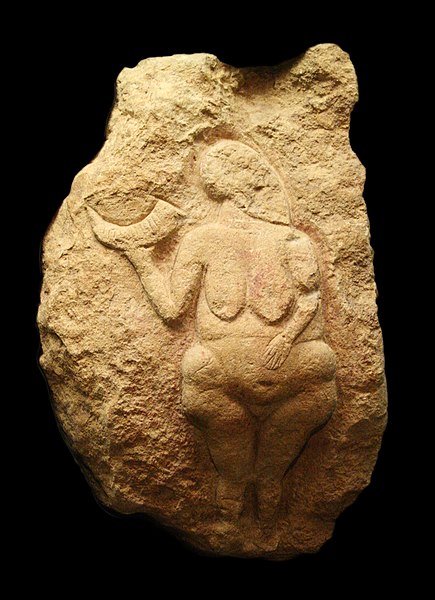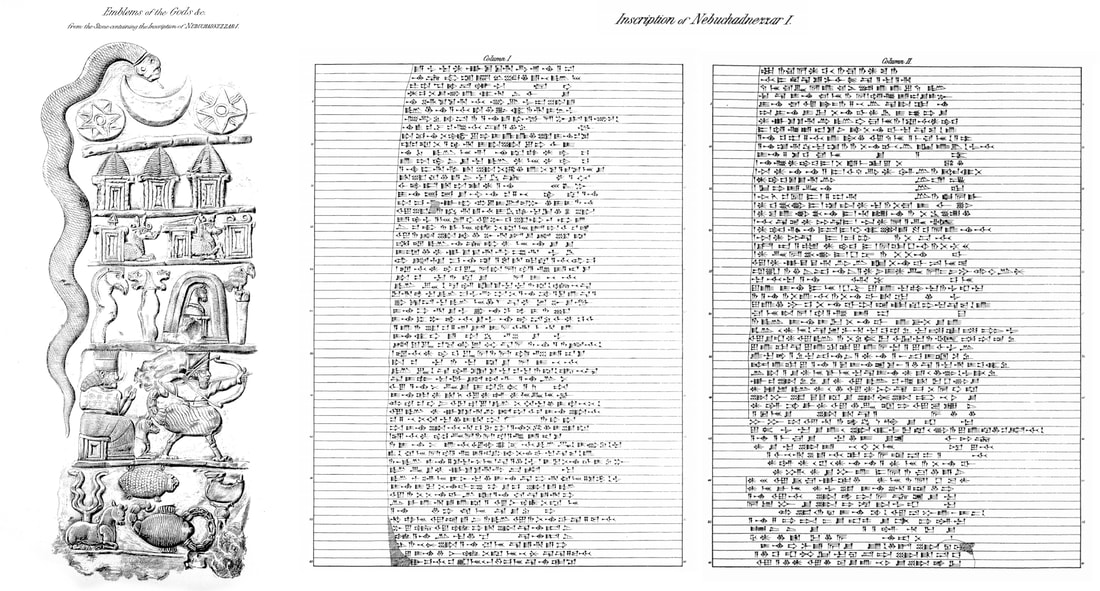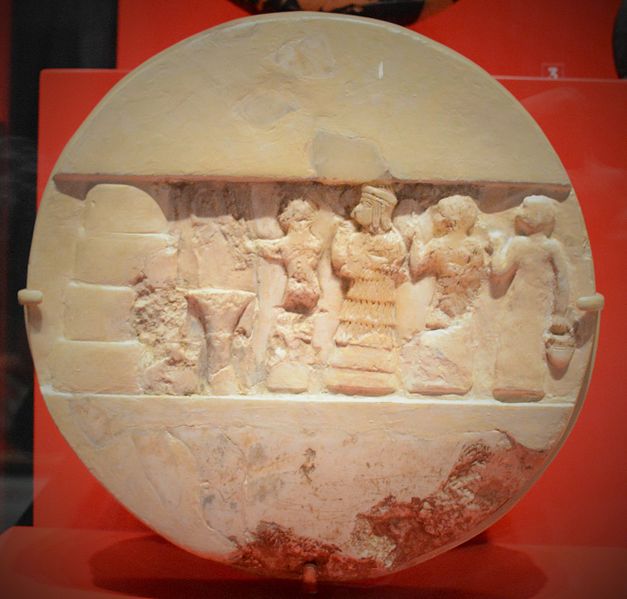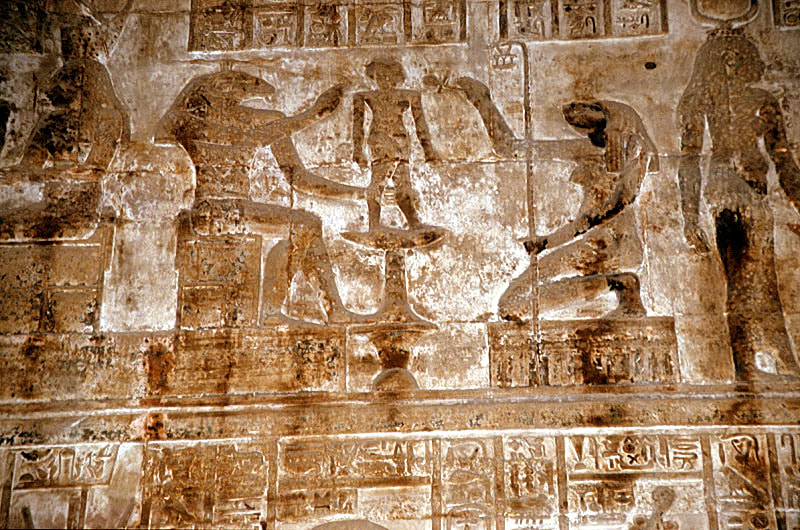|
Venus of Laussel A flint chisel scratched your bas-relief into a sandy block, an art your carver learned from bears clawing their territorial marks on the clay walls of their cave, their lair. The higher their mark, the greater their brute size and power. Your standing was even higher where you once presided, painted with ochre, on a ledge over a rock shelter. Alas, you have fallen into the rubble: scrapers, spear points, bone pendants, pierced reindeer teeth. You lie on your back, survivor of some 26,000 years. Unreadable, your featureless face, ruined by rain, snow, earthquake or enemies? Divine face hard to imagine, details too frightening to carve? Tresses netted or free? No doubt about your breasts, they drop pear-shaped and full, even if pitted and old, so old time was just invented, slashed into the bison horn you, our first teacher, hold. Its 13 downward strokes cut with skillful intent declare our lunar lessons: moon, month, matrix, mater, meter, measure, mealtime, mother unmeasurable. Your gaze towards its crescent pulls us into its seasons, its stories of your 13 moon migration, trekking after the reindeer, the caribou, the passing herds of dappled horses. Your belly swells out of a swell in the soft rock. Your bulging haunches, lumpy with muscle and fat, cushion your desires from the tongues of glaciers slipping into your valleys. Your vulva slopes deep into rock, hiding its generous lips, until a spear-thrower returns from the bison rut with its hump-shouldered males. Females arch backs raise tails. Their heads strain upwards, open mouthed. He enters between the sculpted pillars of your legs. They dwindle like the moon, thin shins, tiny feet, bear skin shoes? The Drunken Serpent Demons swallow the moon. I board a bobbing boat, no safe anchorage in the reeds, no longer of this summer land. Bass drums calmly roll to ease my heart. A sistrum shakes to my sisters’ cries. Their lamentations ring and fade over the waves, water none can drink, none quench their thirst destined for the Nether World of broken forms and dust, dust where the heads of departed kings roll. Their eyes dry. Their sandals broken. Three Days. Three nights, I lie belly down in a cold, rocky cavern. My eyes grow milky. I rub against a boulder, mouth, blunt nose. My dry skin rips. I slip from my worn shroud, sluffing it off like a curse. My tail whips up a storm, softening the hard crust of the earth. I burst forth a willing green shoot. I thunder up, twisting my trunk, a vine promising luscious clusters of fruit. I send shivers through flesh. I side-wind over shrines where vengeful protectors guard Nebuchchadnezza’s lands. I look down on a broad backed tortoise, a monstrous island waiting in the marsh, in the muddy shallows to bite the ankle of an enemy scout. I climb to stout Gula. She sits on her brick shrine, as if it were but a stool. Her dog pricks his ears. Her gold bracelets ring. She claps, claps cursing raiding parties with earth- quakes, storms, and failed seed. Summoned by an ox-skinned drum, her scorpion man crawls from war rubble. He plants his two spurred, spiny feet, nocks his unforgiving arrow, bends his stiff bow. His beard hangs heavy and black. The rim of his high fez rests just above his aiming eye. Its glance brings death. I ascend above 3 domed shrines, where the old gods, drowsy with desert heat, nap on their cedar-perfumed mountain. They wait behind bolted doors studded with copper and gold, wait for those brave enough to meet them in the highest places. Thirst drives me skywards to drink from the moon’s crescent. It overflows with a honey-wine distilled at twilight by Venus and the Sun, rain water, bee’s honey and their grapes, this pale gold nectar. I imbibe deep to the lees, satisfying my immortal needs. Tears of joy, of sadness streak down my cheeks. Dewy spittle sparkles on my lips. I float with the moon, shepherding its herd of wooly clouds and fat-sided stars, eastward over the steppes of Eurasia. Enheduanna, High Priestess of Ur You follow your naked priest through the bulrushes and milkweed. A royal water splasher, he pours a libation into the carp- filled canal to feed Nanna, the Moon God and Ningal his wife, wife you will soon become. You bring her alabaster statue to the river bank, rub her and yourself with soap, wash vagina, breasts and thighs, restoring virginity. Mingled in sweet water, you merge, two waves, two wives, one human, one divine who needs a body, your body to copulate. You don Lady Ningal’s brimmed felt hat and white gown. It is sewn with tiers of tufted wool; these her feathers of a bird goddess flutter on the breeze scented with mountain juniper. Wife now of the Moon, you find him lazing beside his cattle pens in the marsh. They teem with satisfied cows and softly lowing calves. He curls his bushy tail tuft over his monumental flanks. Bovine ears poke from his supernatural sidelocks. His lapis lazuli beard, ripples down like a fertilizing rain that quenches the thirst of dried canal and riverbed. Gazing at you, Nanna parts his sensuous lips, raises a hoof to brush a fly from his flat nose. His fierce, bulging eyes soften with joyous allure. Lightning flashes from his towering headgear; you tremble. Off in the date palms, goats frisk to the beat of a drum. Harp strings, their glittering notes gladden the hearts of young women: “Let us dance in the cowshed. Let the rocking of the churn sing out. Let it throb with milk, with buttery cream.” Nanna sets you on a rustic throne, offers you buttery barley cakes and cups of his wild grape wine, wine that turns what he bellows in the meadows into sweet talk. He lounges on a bed strewn with rose and vetch. His lunar crown lights up the woven roof of rushes and reeds. Lord of the brown-eyed cow and her virile bull, Lord of their countless herds, he lifts up his bridal gift, well-built, never tiring. Untold secret of secrets, how will he take you? Press his loins against yours, or will he mount your offered back coitus a tergo? Night is closing its city gates. He retires over the stone threshold and into his cloudy mountain, leaves behind a diadem, proof of his moonlit visit. Frog-Headed Heqet Speaks From a Dendera Nativity Scene I come from the oldest cult: frogs and serpents from the unbound abyss. My footprints on riverbanks, their moist hieroglyphs, taught my husband, the potter god Khnum, the mysteries of creation, slurry, silt and mud. Khnum’s flood rages for three days and three nights, overflowing the river’s thighs; my children slide forth. Black moons, they bob by the hundreds, some say thousands. Crescent tails break through clouds of jelly, beat and glide towards swamps. A deep-throated chorus fills the night air. My wavy-horned, ram- headed Khnum palms a lump of wet clay, ancestral seed, lunar egg. He slaps it into orbit. Kicking his laboring wheel, he squeezes, lifts and nips to refine its waxing shape. The carvers of our bas-relief, awed by the seriousness of divinity, cut a severe line for my mouth. With their copper chisels, they tucked my human legs, frog-like, under me. They knelt me beneath Khnum, who polishes with a round pebble, the grainy shoulder of the statue spinning on his stone wheel. Don’t be fooled by my lowly station. I preside over what is most momentous. I who transform gills to lungs, raise my tapered river- loving snout, my magical words, my golden ankh to the naked soon-to-be boy on the slowing wheel. I touch my ankh to his untried nose, filling it with sweet marsh air. The gurgle from his watery past gushes into a shrill cry. We help him down from the placenta-shaped wheel, down into time, littered with the piles of wasters and red shards, the ones Khnum will crush and knead with muck and dung to throw anew on his eternal wheel. Charlotte Hussey These poems are from the author's series on lunar animals. Charlotte Hussey, who has an MFA from Warren Wilson College, teaches medieval literature at Montreal’s Dawson College. She has published Rue Sainte Famille and The Head Will Continue to Sing. Completing a McGill University doctorate on the poet H.D. awakened her love of antiquity and led to her publication of Glossing the Spoils, a collection drawing on Western European mythologies that came out in the UK in a second edition in 2017. Her poems can be found in Garden Varieties: An Anthology of the Top Fifty Poems from the National Poetry Contest; 150+ Canada’s History in Poetry; Soul of the Earth: the Awen Anthology of Eco-spiritual Poetry; Pagan Muse: Poems of Wisdom and Inspiration, and in The Deep Music: Offerings from the Awen. Her work appears in numerous literary magazine in Canada, the UK, and US. She can be reached at [email protected]
0 Comments
Your comment will be posted after it is approved.
Leave a Reply. |
The Ekphrastic Review
COOKIES/PRIVACY
This site uses cookies to deliver your best navigation experience this time and next. Continuing here means you consent to cookies. Thank you. Join us on Facebook:
July 2024
|







